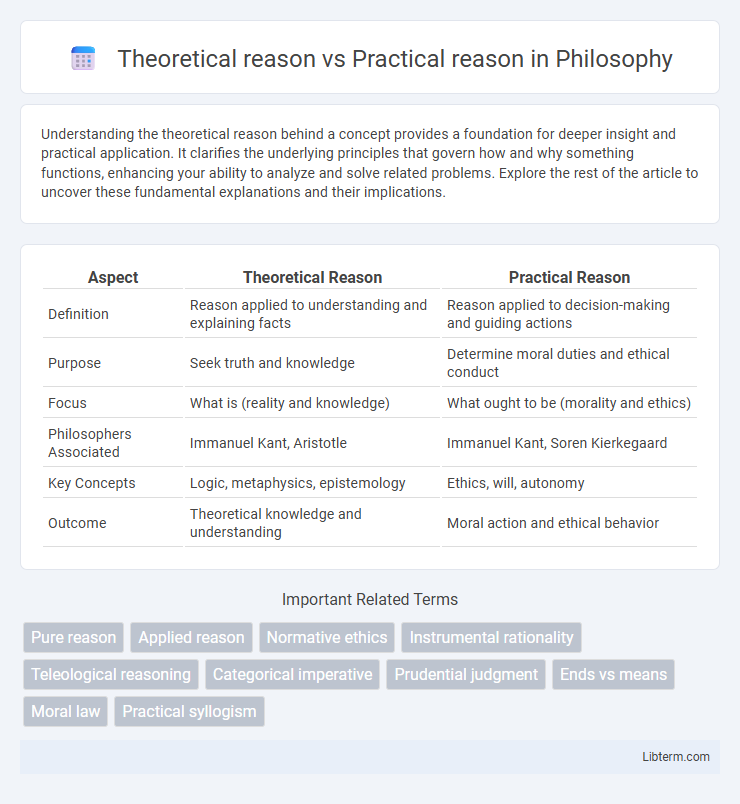Understanding the theoretical reason behind a concept provides a foundation for deeper insight and practical application. It clarifies the underlying principles that govern how and why something functions, enhancing your ability to analyze and solve related problems. Explore the rest of the article to uncover these fundamental explanations and their implications.
Table of Comparison
| Aspect | Theoretical Reason | Practical Reason |
|---|---|---|
| Definition | Reason applied to understanding and explaining facts | Reason applied to decision-making and guiding actions |
| Purpose | Seek truth and knowledge | Determine moral duties and ethical conduct |
| Focus | What is (reality and knowledge) | What ought to be (morality and ethics) |
| Philosophers Associated | Immanuel Kant, Aristotle | Immanuel Kant, Soren Kierkegaard |
| Key Concepts | Logic, metaphysics, epistemology | Ethics, will, autonomy |
| Outcome | Theoretical knowledge and understanding | Moral action and ethical behavior |
Understanding Theoretical Reason
Understanding theoretical reason involves focusing on abstract principles and truths aimed at knowledge acquisition rather than action guidance. It emphasizes the contemplation and analysis of concepts to form coherent frameworks and explanations within fields like philosophy and science. Theoretical reason seeks to uncover underlying causes and universal laws without immediate concern for practical outcomes or applications.
Defining Practical Reason
Practical reason refers to the cognitive process involved in deciding how to act and make choices based on goals, values, and intentions, contrasting with theoretical reason, which focuses on acquiring knowledge and understanding truths. It is fundamentally concerned with normative guidance and the principles that govern action rather than mere contemplation. Central to ethics and decision theory, practical reason evaluates means to achieve desired ends within real-world constraints.
Key Differences Between Theoretical and Practical Reason
Theoretical reason aims to understand and explain facts, focusing on truth and knowledge acquisition without immediate action, while practical reason centers on decision-making and guiding actions based on desires, values, and goals. Theoretical reason operates within a framework of logical coherence and evidence, whereas practical reason involves normative judgments about what one ought to do. Key differences include their objectives--understanding versus doing--and their application areas, with theoretical reason prevalent in sciences and philosophy, and practical reason dominant in ethics and everyday decision-making.
Historical Perspectives on Reasoning
Historical perspectives on reasoning distinguish theoretical reason as the capacity to understand and explain abstract principles, primarily explored by philosophers like Aristotle and Kant who emphasized knowledge and truth-seeking. Practical reason, emerging prominently in Enlightenment thought, relates to action and ethical decision-making, with figures such as Kant defining it as the faculty governing moral judgments and behavior. Throughout history, the interplay between theoretical and practical reason shaped philosophical inquiries into human cognition, ethics, and the nature of rationality itself.
Major Philosophers on Theoretical vs Practical Reason
Immanuel Kant is a pivotal philosopher who distinguished theoretical reason, used to understand and explain the natural world, from practical reason, which guides moral action and ethical decision-making. Aristotle contributed significantly by emphasizing practical reason (phronesis) as essential for virtuous living, contrasting it with theoretical reason, which pertains to scientific knowledge and universal truths. G.W.F. Hegel further developed the interplay between theoretical and practical reason, highlighting how ethical life (Sittlichkeit) emerges through the synthesis of individual freedom and societal norms.
Applications of Theoretical Reason in Everyday Life
Theoretical reason guides the pursuit of knowledge and understanding by analyzing facts and forming logical conclusions, which helps in making informed decisions in everyday life, such as evaluating news sources or troubleshooting technical problems. It supports problem-solving through systematic thinking and critical analysis, allowing individuals to apply scientific principles or mathematical concepts to real-world scenarios. Applications include assessing risks, planning efficient strategies, and understanding cause-effect relationships to improve personal and professional outcomes.
Practical Reason in Ethical Decision-Making
Practical reason in ethical decision-making emphasizes applying moral principles to real-world situations, guiding actions based on values and outcomes rather than abstract theory. It involves evaluating circumstances, intentions, and consequences to determine the most ethical course of action, prioritizing human well-being and social responsibility. Unlike theoretical reason, which seeks truth and understanding, practical reason is action-oriented, focusing on how ethical norms translate into tangible behavior.
Interdependence of Theoretical and Practical Reason
Theoretical reason involves the pursuit of knowledge and understanding, while practical reason focuses on action and decision-making based on ethical or pragmatic considerations. These forms of reason are interdependent because practical reason relies on theoretical insights to inform sound judgments, and theoretical reason gains relevance through its application in real-world contexts. The dynamic interplay ensures that abstract principles are continually tested and refined through practice, fostering coherent and effective reasoning processes.
Contemporary Debates on Reasoning
Contemporary debates on reasoning emphasize the distinction between theoretical reason, which seeks truth and knowledge through abstract, objective analysis, and practical reason, which guides action based on values and goals in real-world contexts. Theoretical reason is often aligned with epistemic justification and logical coherence, while practical reason engages with normative considerations, decision-making processes, and moral reasoning. Recent discussions explore how these modes of reasoning intersect, influence human cognition, and inform ethical frameworks in applied philosophy and cognitive science.
The Future of Reason in Philosophy and Society
The future of reason in philosophy and society hinges on balancing theoretical reason, which prioritizes knowledge and truth, with practical reason, centered on action and ethical decision-making. Advances in artificial intelligence and cognitive science challenge traditional boundaries by integrating computational logic with human values, driving a shift towards more dynamic, context-sensitive reasoning frameworks. Emphasizing this interplay fosters novel approaches in ethical governance, technological innovation, and social justice, shaping reason as both an analytical and normative force in evolving global contexts.
Theoretical reason Infographic

 libterm.com
libterm.com